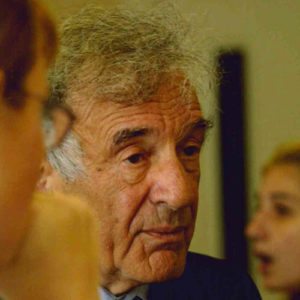I recall Dr. Wiesel saying a few times that when he finally did arrive to meet God, he would have only this to ask of him: “Mr. God, … why?” I assume that now Mr. God is preparing for a long interview, and I can think of no more fitting a person to give it. This is what I recall most vividly about him; that he always had spirit enough to question anyone and anything, even God.
One might erroneously assume that Dr. Wiesel’s virtues came solely from his experience through one of humanity’s darkest times, but it is clear that the clay was strong before it ever reached the kiln. To put to question the world he lived in was simply in his nature, with the fierceness of Elijah and the persistence of Moses. But there is questioning and then there is living, and for Dr. Wiesel the two were beautifully intertwined. Questioning the world was coming to face reality, and in facing reality, coming to decide what ought to be done; an ethicist at his very core. It wasn’t only reflected in his personality but his art as well. His literature spanned a myriad of topics, but a similar thread often ran throughout: “In light of what we find by examining our lives and the world around us, how should we live and what should we do?” And for Elie Wiesel, it wasn’t enough to merely see such things clearly during the day but when the night has fallen as well. I know many might think of him as a prism through which the rays of hope could shine in all the colors of the rainbow. But even before this, I found him to be a prism through which all the colors of reality became clear. In fact, real might be the single best description I have to offer of the man.
Sincerely, I still hear his advice at times, especially in those darker moments when one has to wonder who helms such a mad ship as this world. I have often bragged about knowing him to nearly anyone I’ve ever met, and I still keep every paper of mine he has ever commented on. And now, as a teacher, I find there are many times when his lessons have become mine, and I can already see that such rivers will run far and wide.
In typing this, memories begin to return like snowflakes falling back from heaven. I remember Dr. Wiesel urging me to continue studying the classics, especially the philosophical poets. I remember him explaining why he doesn’t type stories on computers, and I remember the smell of Dr. Johnston’s office where we would talk; and during our talks, we would both laugh as we agreed that no matter how much we studied, we both knew we’d never be as wise as our mothers. I think my favorite memory is the lightheaded feeling I always got when talking to him. A feeling that always marked a mutual appreciation for the way the world was. And anyway, he preferred Camus over Sartre, which speaks more to his character than I ever could.
He was a gift to his people, and a gift to his students, and by most he will be remembered as a gift to the world. But I hope it’s not too bold for me personally to remember him not only as a good teacher but, most importantly, a good friend.
—Geoffrey Fella ’14


